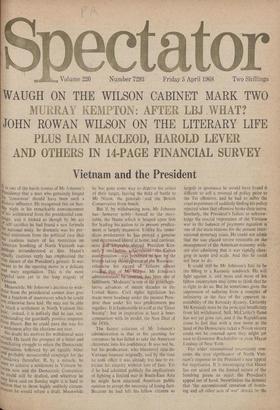Vietnam and the President
Meanwhile, Mr Johnson's decision to with dr 1,'lw from the presidential contest does give "nil a freedom of manoeuvre which he could not otherwise have had. He may not be able k) reach a settlement in North Vietnam this year: indeed. it is unlikely that he can, not- withstanding the guardedly positive response (ruin Hanoi. But he could pave the way for a settlement after the elections are over. he has gone some way to deprive his critics of their target, leaving the field of battle to Mr Nixon, the generals-:--and the British Conservative front bench.
- But if, by withdrawing now, Mr Johnson has - however nobly--bowed to the inevi- table, the blame which is heaped upon him for leading his nation to its present predica- ment is largely excessive. Unlike his imme- diate predecessor he has proved a genuine and determined liberal at home, and cautious. wise gridnidaptahlbrogd:, President Ken- nedy 0nel:110# yl4eVeirtifiP4Itt:Quba n conf;ntation—was prNthkarttritly' bt the brea -taking iM4h)iiigtenthe Russians otherwise his relcipid orqadures altrnost rival of fafroViNtirm. Mr JohrOon's administratidetPaintrauttc*s..keen Oefte of fulfilment. 'Medicare' is one of theireatlegis- !alive advances of recent decades in the United States. Civil rights legislation has made more headway tinder the present Presi dent than under his two predecessors put together. It is fashionable to scoff at the 'Great Society': but in inspiration at least it bears comparison with its model, the New Deal of the 1930s.
The fairest criticism of Mr Johnson's administration is that in his yearning for consensus he has failed to take the American ,electorate into his confidence. It was not he. but his predecessor, who blundered into the Vietnam impasse originally, and by the time he took office it was already too late to ex- tricate his country without loss of face. Yet if he had admitted publicly the implications of fighting a limited war in South-East Asia he might have educated American public opinion to accept the necessity of losing face. Because he had left his fellow citizens so largely in ignorance he would have found it difficult to sell a reversal of policy prior to the Tet offensive, and he had to suffer the cruel experience of suddenly finding his policy rejected when that offensive broke their nerve. Similarly, the President's failure to acknow- ledge the crucial importance of the Vietnam war in the balance of payments equation is one of the main reasons for the present inter- national monetary crisis. He could not admit that the war placed severe restraints on the management of the American economy with- out also admitting that it was rapidly chan- ging in scope and scale. And this he could not hear to do.
It could still be Mr Johnson's fate to be the filling in a Kennedy sandwich. He will fight against it, and more and more of his fellow countrymen may come to think that he is .right to do so. But he sometimes gives the impression of suffering from a complex of inferiority in the face of the apparent in- evitability of the Kennedy dynasty. Certainly Mr Kennedy must be the principal beneficiary from his withdrawal. Still, McCarthy's flame has not yet gone out: and if the Republicans come to feel that with a new name at the head of the Democratic ticket a Ni \on victory could not be counted upon they might yet turn to Governor Rockefeller or even Mayor Lindsay of New York.
The wider international uncertainty con- cerns the true significance' of North Viet- nam's response to the President's new appeal for negotiation. It is encouraging that Hanoi has not seized on the limited nature of the bombing pause to reject the President's appeal out of hand. Nevertheless the demand that 'the unconditional cessation of bomb- ing and all other acts of war' should be the exclusive subject of preliminary talks is a decidedly guarded opening posture.
The calculation which Hanoi has pre- sumably to make is whether by dragging on the war until after the Presidential elec- tions it is then more likely to face a hawk- ish President determined to reach an early military settlement by raising the war to a new dimension, or alternatively a new in- cumbent determined to withdraw on any terms or none. On his past record Mr John- son cannot be expected to move to either of these extremes. To that extent his de- cision to place himself above the political struggle does not alter the stakes. The de- cisive factor is likely still to be. as it was before, North Vietnam's assessment of the war-weariness of American public opinion.















































 Previous page
Previous page